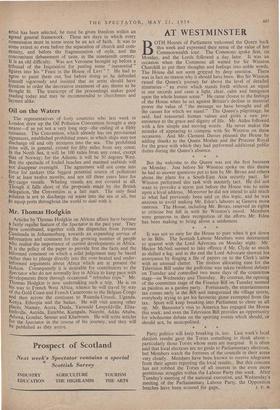Oil on the Waters
The representatives of forty countries who last week in London drew up the Oil Pollution Convention brought a step nearer—if as yet not a very long step—the ending of a filthy nuisance. The Convention, which already has ten provisional signatures, established prohibited zones, in which ships may not discharge oil and oily mixtures into the sea. The prohibited zone will, in general, extend for fifty miles from any coast; in the North Sea, it will be 100 miles from any coast, except that of Norway; for the Atlantic it will be 30 degrees West. But the spectacle of fouled beaches and maimed seabirds will not disappear overnight. The agreement will not come into force for tankers (the biggest potential source of pollution) • for at least twelve months, and not till three years later for flrY-cargo vessels. Whaling vessels are not covered at all. Though it falls short of the proposals made by the British delegation, -the Cbnvention is a fair start. The only final solution is not to discharge oil waste into the sea at all, but to equip ports throughout the world to deal with it.


































 Previous page
Previous page